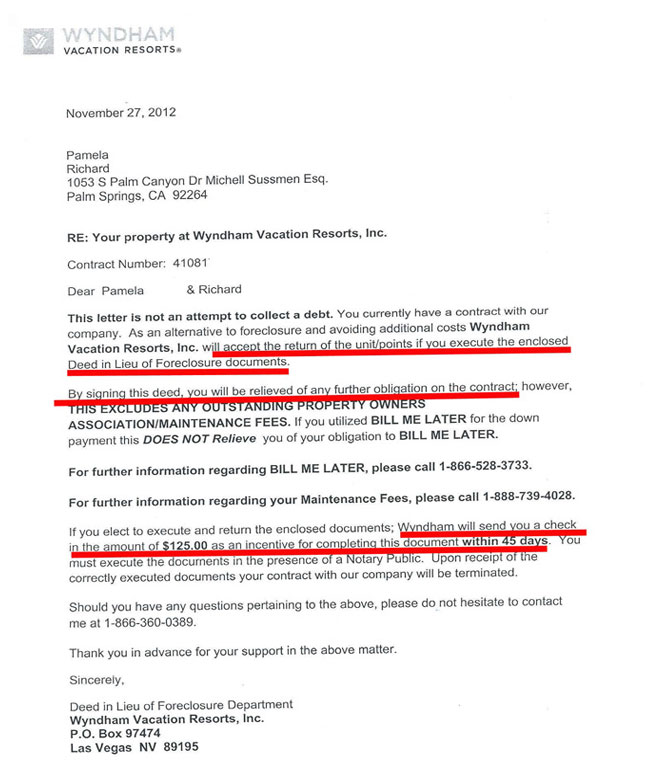Run away!) As far as offering it away, that's not a great response either. If owning a timeshare has been so unpleasant for you, why put that challenge on an enjoyed one? This one is our preferred. This concept states that if you just close your eyes, overlook it and wish actually hard, your timeshare will disappear. As much as you want that held true, it isn't. You owe these people money. And they're not going to let you forget it. If you don't pay, they'll turn your unpaid charges over to debt collection agency. Cue the manipulative phone calls at all hours of the day and night! If you still do not pay, your timeshare may enter into foreclosure, but that's not ensured.
We're talking months of court fights, legal fees and heartachesall since you listened to your dumb-butt neighbor who told you to give up making your payments. We understand you're ill and sick of paying these vultures, however they are not worth the frustration of being bothered and pestered. Yes! And you'll be happy you did. While you're likely to pay a few thousand dollars to leave your timeshare agreements, you'll recoup your expenses and save money in the long run. Let's break it down: In 2019, the average timeshare upkeep fees were $1,000 each year.4 Costs increase by 5% each year, usually.
And with all that moneyand your newfound sense of freedomyou can take the whole household to Cabo and pay money!.
You have actually most likely heard about timeshare properties. In truth, you have actually most likely heard something negative about them. However is owning a timeshare actually something to prevent? That's difficult to say until you understand what one actually is. This article will review the basic idea of owning a timeshare, how your ownership might be structured, and the benefits and disadvantages of owning one. A timeshare is a method for a variety of people to share ownership of a home, normally a vacation property such as a condo system within a resort location. Each purchaser typically purchases a certain period of time in a particular system.
If a purchaser desires a longer period, purchasing several successive timeshares might be an option (if readily available). Traditional timeshare properties typically sell a set week (or weeks) in a residential or commercial property. A purchaser chooses the dates he or she wishes to invest there, and buys the right to use the residential or commercial property during those dates each year. Some timeshares use "versatile" or "drifting" weeks. This plan is less rigid, and permits a purchaser to choose a week or weeks without a set date, however within a specific time period (or season). The owner is then entitled to book his/her week each year at any time during that time duration (subject to accessibility).

Since the high season might extend from December through March, this offers the owner a little bit of getaway versatility. What sort of home interest you'll own if you buy a timeshare depends on the kind of timeshare acquired. Timeshares are normally structured either as shared deeded ownership or shared leased ownership. With shared deeded ownership, each owner is given a percentage of the real estate itself, associating to the amount of time bought. The owner receives a deed for his or her portion of the unit, specifying when the owner can utilize the home. This means that with deeded ownership, numerous deeds are provided for each home.

If the timeshare is structured as a shared rented ownership, the developer keeps deeded title to the property, and each owner holds a leased interest in the property. Each lease agreement entitles the owner to utilize a specific https://diigo.com/0nb23u residential or commercial property each year for a set week, or a "drifting" week during a set of dates. If you purchase a leased ownership timeshare, your interest in the property generally expires after a particular term of years, or at the current, upon your death. A leased ownership likewise generally restricts property transfers more than a deeded ownership interest. how to get out of a holiday inn club timeshare. This implies as an owner, you might be limited from selling or otherwise moving your timeshare to another.
A Biased View of Who Has The Best Timeshare Program
With either a leased or deeded kind of timeshare structure, the owner buys the right to utilize one specific property. This can be restricting to someone who chooses to vacation in a variety of locations. To use higher versatility, numerous resort developments take part in exchange programs. Exchange programs enable timeshare owners to trade time in their own property for time in another taking part home. For example, the owner of a week in January at a condominium system in a beach resort may trade the property for a week in a condominium at a ski resort this year, and for a week in a New york city City lodging the next.
Typically, owners are restricted to picking another property classified similar to their own. Plus, extra fees prevail, and popular residential or commercial properties might be tricky to get. Although owning a timeshare methods you won't require to throw your money at rental lodgings each year, timeshares are by no methods expense-free. First, you will require a piece of money for the purchase rate. If you do not have the total upfront, expect to pay high rates for funding the balance. Considering that timeshares rarely maintain their worth, they won't get approved for financing at most banks. If you do discover a bank that agrees to finance the timeshare purchase, the rates of interest is sure to be high.
A timeshare owner needs to also pay annual maintenance charges (which normally cover expenditures for the maintenance of the home). And these charges are due whether or not the owner utilizes the property - how does flexi-club timeshare work. Even worse, these fees commonly intensify constantly; often well beyond a budget friendly level. You might recoup some of the costs by leasing your timeshare out throughout a year you do not utilize it (if the guidelines governing your specific property enable it). Nevertheless, you might require to pay a portion of the lease to the rental agent, or pay extra costs (such as cleaning or booking charges). Getting a timeshare as an investment is seldom an excellent concept.
Rather of appreciating, a lot of timeshare diminish in worth once bought. Many can be hard to resell at all. Rather, you should consider the value in a timeshare as a financial investment in future vacations. There are a variety of reasons why timeshares can work well as a getaway alternative. If you getaway at the very same resort each year for the exact same one- to two-week duration, a timeshare may be an excellent method to own a home you like, without incurring the high costs of owning your own house. (For information on the expenses of resort home ownership see Budgeting to Buy a Resort House? Costs Not to Ignore.) Timeshares can likewise bring the comfort of understanding simply what you'll get each year, without the inconvenience of booking and renting lodgings, and without the fear that your preferred place to remain will not be offered.